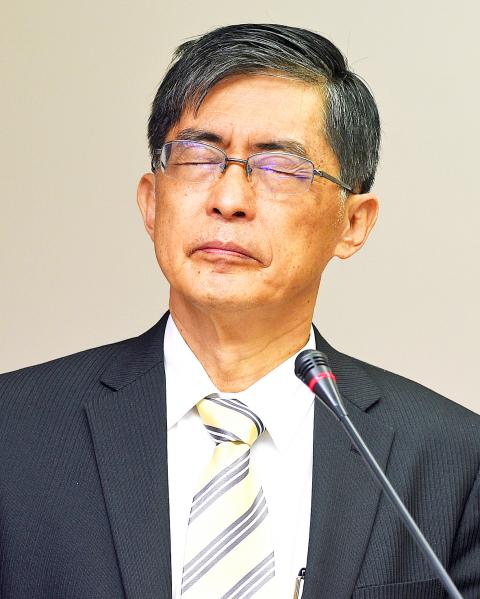A legislative committee session yesterday sputtered into gridlock as legislators and government officials sparred over legal language in proposed amendments to limit air pollution, prompting several legislators to accuse the authorities of being nonchalant about potential health hazards posed by factory emissions.
The session focused on capping factory-emitted PM2.5 — airborne pollutants measuring less than 2.5 micrometers — identified as a carcinogen by the WHO and the International Agency for Research on Cancer.
An amendment proposed by Democratic Progressive Party (DPP) Legislator Lin Shu-fen (林淑芬) said that if the annual concentrations of air pollutants — ozone, PM10 and PM2.5 — gauged in a municipality exceeds the annual standard stipulated by the Environmental Protection Administration (EPA) for three years in a row, that municipality shall be designated a “level 3” air pollution prevention zone, meaning air quality in the region is in breach of emission standards.

Photo: Lo Pei-der, Taipei Times
Furthermore, if a municipality records subpar air quality for five consecutive years, it alone — or together with its neighbors — shall be designated an overall emission control zone, which would prohibit the establishment of new factories unless proprietors obtain emission quotas granted to existing plants by auction or direct trading.
Lin said that air pollutants produced throughout the nation often exceed standards set by the administration, but that there has been no legal tool to hold plants accountable for emissions since the act was introduced in 1999.
An amendment submitted by DPP Legislator Liu Chien-kuo (劉建國) proposes a standard emission inspection system and an emission quota trading system for control zones, and that the systems be introduced after the administration consults with the Ministry of Economic Affairs.
EPA and ministry officials objected to both plans.
Department of Air Quality Protection and Noise Control Director-General Chen Hsien-heng (陳咸亨) said that since the makeup of industrial sectors and their clientele vary, and the pollution reduction technology employed by each firm varies, the proposed rules should not be imposed indiscriminately.
Environmental Protection Administration Minister Wei Kuo-yen (魏國彥) suggested that Lin’s phrasing of “shall” be changed to “may,” in accordance with the wording of the article she intends to amend, saying that it allows for more “flexible” enforcement.
He also said that Liu’s use of the word “consult” should be changed to “convene with” — a sentiment echoed by Ministry of Economic Affairs Deputy Minister Shen Jong-jin (沈榮津).
Chen and Wei’s remarks angered some legislators, who said the officials attempted to stall the introduction of overall emission control zones to protect businesses at the cost of public health, and that their proposed wording aimed at weakening accountability for pollution.
Lin criticized the EPA, saying it “subordinates itself” to the ministry, while DPP Legislator Chao Tien-lin (趙天麟), who chaired the meeting, asked Wei if the administration had “completely abandoned its principles.”
Chao broke up the meeting after announcing that the proposed amendments would be taken to the grand assembly for further discussions. None of the 10 amendments discussed yesterday were passed.

CHAOS: Iranians took to the streets playing celebratory music after reports of Khamenei’s death on Saturday, while mourners also gathered in Tehran yesterday Iranian Supreme Leader Ayatollah Ali Khamenei was killed in a major attack on Iran launched by Israel and the US, throwing the future of the Islamic republic into doubt and raising the risk of regional instability. Iranian state television and the state-run IRNA news agency announced the 86-year-old’s death early yesterday. US President Donald Trump said it gave Iranians their “greatest chance” to “take back” their country. The announcements came after a joint US and Israeli aerial bombardment that targeted Iranian military and governmental sites. Trump said the “heavy and pinpoint bombing” would continue through the week or as long

TRUST: The KMT said it respected the US’ timing and considerations, and hoped it would continue to honor its commitments to helping Taiwan bolster its defenses and deterrence US President Donald Trump is delaying a multibillion-dollar arms sale to Taiwan to ensure his visit to Beijing is successful, a New York Times report said. The weapons sales package has stalled in the US Department of State, the report said, citing US officials it did not identify. The White House has told agencies not to push forward ahead of Trump’s meeting with Chinese President Xi Jinping (習近平), it said. The two last month held a phone call to discuss trade and geopolitical flashpoints ahead of the summit. Xi raised the Taiwan issue and urged the US to handle arms sales to

State-run CPC Corp, Taiwan (CPC, 台灣中油) yesterday said that it had confirmed on Saturday night with its liquefied natural gas (LNG) and crude oil suppliers that shipments are proceeding as scheduled and that domestic supplies remain unaffected. The CPC yesterday announced the gasoline and diesel prices will rise by NT$0.2 and NT$0.4 per liter, respectively, starting Monday, citing Middle East tensions and blizzards in the eastern United States. CPC also iterated it has been reducing the proportion of crude oil imports from the Middle East and diversifying its supply sources in the past few years in response to geopolitical risks, expanding

Pro-democracy media tycoon Jimmy Lai’s (黎智英) fraud conviction and prison sentence were yesterday overturned by a Hong Kong court, in a surprise legal decision that comes soon after Lai was jailed for 20 years on a separate national security charge. Judges Jeremy Poon (潘兆初), Anthea Pang (彭寶琴) and Derek Pang (彭偉昌) said in the judgement that they allowed the appeal from Lai, and another defendant in the case, to proceed, as a lower court judge had “erred.” “The Court of Appeal gave them leave to appeal against their conviction, allowed their appeals, quashed the convictions and set aside the sentences,” the judges